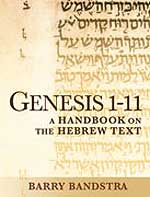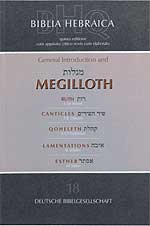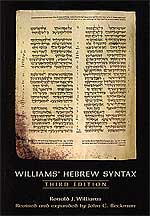The Vatican made the news recently with the barring of the pronunciation of the name “Yahweh” — the proper name used for Israel’s God in the Hebrew Bible/Old Testament — in Catholic worship. It appears that the use of the name Yahweh has been creeping into the Catholic churches liturgy of late, as it has been in the Protestant tradition as well. Here are some excerpts from the Catholic News Service report:
Bishop Arthur J. Serratelli of Paterson, N.J., chairman of the U.S. bishops’ Committee on Divine Worship, announced the new Vatican “directives on the use of ‘the name of God’ in the sacred liturgy” in an Aug. 8 letter to his fellow bishops.
….
His letter to bishops came with a two-page letter from the Vatican Congregation for Divine Worship and the Sacraments, dated June 29 and addressed to episcopal conferences around the world.“By directive of the Holy Father, in accord with the Congregation for the Doctrine of the Faith, this congregation … deems it convenient to communicate to the bishops’ conferences … as regards the translation and the pronunciation, in a liturgical setting, of the divine name signified in the sacred Tetragrammaton,” said the letter signed by Cardinal Francis Arinze and Archbishop Malcolm Ranjith, congregation prefect and secretary, respectively.
The Tetragrammaton is YHWH, the four consonants of the ancient Hebrew name for God.
“As an expression of the infinite greatness and majesty of God, it was held to be unpronounceable and hence was replaced during the reading of sacred Scripture by means of the use of an alternate name: ‘Adonai,’ which means ‘Lord,'” the Vatican letter said. Similarly, Greek translations of the Bible used the word “Kyrios” and Latin scholars translated it to “Dominus”; both also mean Lord.
“Avoiding pronouncing the Tetragrammaton of the name of God on the part of the church has therefore its own grounds,” the letter said. “Apart from a motive of a purely philological order, there is also that of remaining faithful to the church’s tradition, from the beginning, that the sacred Tetragrammaton was never pronounced in the Christian context nor translated into any of the languages into which the Bible was translated.”
This story was also picked up today by Christianity Today. The CT article surveyed a variety of opinions by evangelical leaders, some who agree with the Vatican ban and others who disagreed. Carol Bechtel, professor of Old Testament at Western Theological Seminary in Holland, Michigan is quoted as saying:
It’s always left me baffled and perplexed and embarrassed that we sprinkle our hymns with that name. Whether or not there are Jewish brothers and sisters in earshot, the most obvious reason to avoid using the proper and more personal name of God in the Old Testament is simply respect for God.
I’m not sure if I entirely agree. I do agree that we should not use the name if it is going to offend someone. When I teach Hebrew at the University of Alberta we discuss this issue in one of the first classes. I explain a bit about the name and how it has been preserved in the various textual traditions and versions, the early practice of avoiding the pronouncing the name, and current practices. Then we decide as a class what we want to do. Typically there are some Jews in the class who are uncomfortable pronouncing the name and we decide to read either “Adonai” or “haShem” (“the Name”) when we encounter the Tetragram (i.e., the four-letter name for God, YHWH or יהוה). At Taylor, however, where my students are all Christians, no one typically has any strong opinions either way.
Part of me wants to assert that if God didn’t want us to use the name, he wouldn’t have given it to the ancient Israelites. And I’m not sure if it is a matter of respecting God. I don’t like the practice of substituting a title (e.g., LORD) for a proper name, since it makes God rather impersonal.
On the other hand, the tradition of avoiding the pronunciation of the name is ancient. The Greek translators of the Septuagint — with some exceptions such as P. Fouad 266 (Rahlfs 848) — used the Greek word for “Lord,” kyrios (κυριος) to represent the divine name. While there are some scholars who maintain the original Septuagint (LXX) wrote out the Tetragram in Aramaic or paleoHebrew letters akin to the the Minor Prophets scroll (8 HevXIIgr), these manuscripts represent more of an archaizing tendency than anything original (see Al Pietersma’s 1984 article “Kyrios or Tetragram: A Renewed Quest for the Original LXX”). Thus as early as the third century BCE, a surrogate was used for the Tetragram.
Setting the divine name apart was also reflected in the practice of some Dead Sea Scrolls writing the Tetragram with paleoHebrew letters. And the early Christians continued the tradition started in the LXX of substituting kyrios (κυριος) for Yahweh. Thus, this practice is found in early Christian tradition as well as most of the versions and translations throughout Christian history — which the exception of the KJV employing “Jehovah” in a handful of passages. Speaking of Jehovah… and yes, this is one of my pet peeves… I think it should be stricken from all hymn books and choruses! While we may not know exactly how the Tetragram was pronounced in antiquity (in this regard “Yahweh” is the best scholarly guess), we know for sure that it was NOT pronounced as “Jehovah”!
Jewish tradition is also pretty clear: pronouncing the divine name was avoided in order to ensure it is never misused (putting a hedge around the Torah) and also for respect. Manuscripts in the Masoretic tradition point the Tetragram with the vowels of title like Adonai as a perpetual ketiv-qere (interestingly, the Leningrad Codex is not consistent with what vowels are found with YHWH).
So when it comes right down to it, there is a long tradition of avoiding the pronunciation of the Tetragram, so perhaps we should follow suit.
What do you think? And what do you think is an appropriate surrogate?


 So, as I mentioned in a
So, as I mentioned in a  In the Hebrew Bible section I have now included Biblia Hebraica Quinta project. As most of my readers are probably aware, BHQ is the new critical edition of the Hebrew Bible that is being produced under the auspices of the United Bible Societies. It follows in the tradition of BHS and BHK before it, with some exceptions. One change in approach that I am not entirely in favour of is the new policy against conjectural emmendations (i.e., a proposed reading that does not have external textual support, but does have intrinsic probability). While I am not a big fan of conjectural emendations (although I have always found the plethora suggested by Driver to be at the very least entertaining), they have a place in the practice of textual criticism. There are some places in the Hebrew Bible where the MT doesn’t make sense and other texts do not help. This is when a good text critic will suggest an emendation. At any rate, there are currently three fascicles available:
In the Hebrew Bible section I have now included Biblia Hebraica Quinta project. As most of my readers are probably aware, BHQ is the new critical edition of the Hebrew Bible that is being produced under the auspices of the United Bible Societies. It follows in the tradition of BHS and BHK before it, with some exceptions. One change in approach that I am not entirely in favour of is the new policy against conjectural emmendations (i.e., a proposed reading that does not have external textual support, but does have intrinsic probability). While I am not a big fan of conjectural emendations (although I have always found the plethora suggested by Driver to be at the very least entertaining), they have a place in the practice of textual criticism. There are some places in the Hebrew Bible where the MT doesn’t make sense and other texts do not help. This is when a good text critic will suggest an emendation. At any rate, there are currently three fascicles available: Finally, one other grammar I want to highlight is John C. Beckman’s thorough revision and expansion of R.J. William’s Hebrew Syntax: An Outline.
Finally, one other grammar I want to highlight is John C. Beckman’s thorough revision and expansion of R.J. William’s Hebrew Syntax: An Outline.